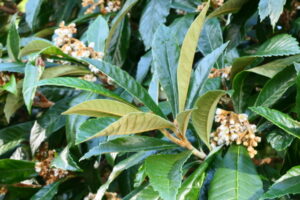 Loquat Leaf Tea (Eriobotrya japonica)
Loquat Leaf Tea (Eriobotrya japonica)
Rosina T. Schmidt
Loquat, a subtropical tree, has a long history as herbal medicine in Japan, and other Asian lands. Even though Loquat’s edible fruit is rich in calcium, vitamin A, iron and potassium, its therapeutic power is contained in the glossy evergreen large leaves. The tea made of loquat leaves has a reputation to promote skin, respiratory and intestinal health.
Loquat leaves contain an antioxidant known as B-17 (Amygdalin), as well as linoleic acids and plant sterols that encourage normal liver functions. The liver is the first line of defence for eliminating toxins from the body.
The tormentic acid of triterpenes in the loquat leaf encourages polysaccharide production – an important component of insulin production. It promotes normal Blood Sugar.
There is more to this Loquat leaf tea, like the support of the respiratory system. Loquat tea has been used for generations as a remedy for congestion, cough, lung irritation and sensitivity to irritants.
As the loquat leaf has beneficial antioxidants, in the clinical examination of mice with loquat tea extract in 2011 memory improvements were observed.
Loquat leaf topical cream is excellent against environmental sensibility irritated skin. The tea has also been used to soothe swollen gums.
Loquat leaf tea instruction
. To 4 cups of cold water add 2 heaping tablespoons of crushed loquat leaves. (2 large leaves.)
. Heat to a full, rolling boil.
. Let it simmer for 15 minutes by turning the heat down.
. Turn the heat off and cool down for 10 minutes.
. Strain and serve.
Sources: Dr. Droup, DC, at “Global Healing” magazine

 Meetings are held at 7:30pm on the second Thursday of each month from September through May at Beban Park, 2300 Bowen Road, Nanaimo, BC
Meetings are held at 7:30pm on the second Thursday of each month from September through May at Beban Park, 2300 Bowen Road, Nanaimo, BC